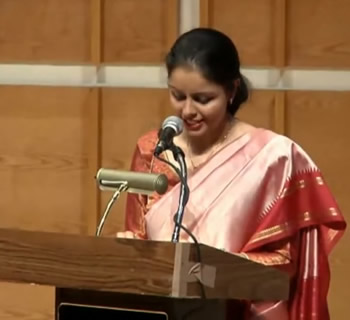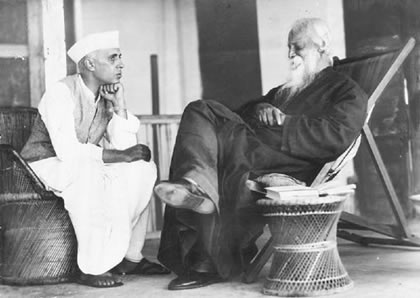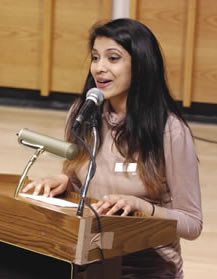SCHILLER INSTITUTE CONFERENCE
Building A World Land-Bridge:
Realizing Mankind's True Humanity
Thursday, April 7, 2016, 9:00am - 9:30pm
NEW YORK CITY
Panel III: Classical Culture: The Only Basis for a Dialogue of Civilization
Message from Dr. Jayaraman Ji, Poet
Introduction to the poem, “Ekla Chalo Re”, by Sri Rabindranath Tagore
Presented by Avneet Thapar
 Click to watch Avneet Thapar's presenation, in the Panel III video starting at 12m 48s from the beginning. Shruti Sen begins singing Tagore's poem, "Ekla Chalo Re", at 17m 38s. |
Program and video
Invitation
Good evening and namaste. Dr P. Jayaraman is a world renowned figure in the field of Hindi Literature and Education. A scholar in Sanskrit, Hindi, Tamil and Indian philosophy, he worked with the Reserve Bank of India before joining the Bhartiya Vidya Bhavan which in English translates as the 'Institute of Indian Culture'.
The Bhavan was founded in India in 1938 by the visionary Dr. K.M.Munshi with the blessing of Mahatma Gandhi in order to revive the true Indian culture, heritage and education suppressed for centuries by foreign powers such as the British Empire.
It has more than 60 branches around the world and several educational institutions and it has to its credit more than 1000 publications on varied subjects.
It is an Organization committed to promoting Indian culture, values and philosophy and enriching the Indian art forms, music, dance, drama, painting and films. It is also an institute of Indian languages, literature and studies of Indian religion and different system of Indian philosophy.
Dr Jayaraman was awarded the Padma Shri Award, the 4th highest civilian honour by the Indian government in 2009 by the President of India. Although he couldn't come in person today, he has sent greetings which I will now read:
Cultural Unity Needed for creating Peace in the World Community
My prayerful message for this dialogue of civilizations is as follows:
The Indian wise men - Sages have given us numerous instructions for creating classical cultural unity within us.
The following Hymn or Mantra from one of the first and foremost Indian scriptures- Yajurveda is one among them;
Mitrasya Ma Chakshusha
Sarvaani Bhootaani Sameekshantaam!
Mitrasyaaham Chakshusha
Sarvaani Bhootaani
Sameekshe!
Mitrasya Chakshusha
Sameekshaamahe!
Meaning -
May all beings look on me with the eye of a friend!
May I look on all beings with the eye of a friend!
May we look on one another with the eye of a friend
Another Vedic mantra says:
Sarvaa Aashaa Mama Mitram Bhavantu ( May all directions be my friends)
Can we not easily follow this principle for creating peace within us?
The above should be the basis for building a world-land with all-round unity and peace.
Thank you.
Dr P Jayaraman.
Tagore’s Poetry

Public domain
Rabindranath Tagore (1861-1941), at right, with Jawaharlal Nehru in 1940. |
And now I would like to introduce you to another Indian poet, Sri Rabindranath Tagore. Born in 1861 (just shortly after the 1857 Mutiny which was the First War of Indian Independence) . The first non-European to win a Nobel Prize, Tagore became in his time, a fiery writer, poet and activist.
In the aftermath of the 13th April 1919 British Massacre of thousands of innocent civilians in Amritsar, Punjab, he returned his British knighthood and engaged in the struggle to liberate India.
Among his many poems, three were adopted as national anthems of India, Sri Lanka and Bangladesh. Today, I have a beautiful Indian singer, Ms. Shruti Sen, to present a popular patriotic poem written by Tagore in 1905. Shruti got her training in Indian Classical Music through her mother Sanjukta Sen, who was a disciple of Smt Girja Devi, a well-known Indian Classical singer. She plays the piano and many other instruments and has performed at the Avery Fisher Hall, Carnegie Hall, Bhartavidya Bhavan, the United Nations, Indian Consulate among many other locations. Today she spends her time teaching music and performing at events and every Sunday, sings in the Cobble Hill Church Choir.

EIRNS/Stuart Lewis
Shruti Sen |
The song titled "Ekla Chalo Re" exhorts the listener to continue his or her journey unafraid, despite lack of public support or consent. It's an important lesson for all of us today. The song was written by Tagore to unite Bengalis when Bengal was to be partitioned in 1905. Mahatma Gandhi was deeply influenced by this song and cited it as one his favorite songs.
So please join me in welcoming Shruti Sen to recite Tagore for us.
In Bengali
যদি তোর ডাক শুনে কেউ না আসে তবে একলা চলো রে।
একলা চলো, একলা চলো, একলা চলো, একলা চলো রে॥
যদি কেউ কথা না কয়, ওরে ও অভাগা,
যদি সবাই থাকে মুখ ফিরায়ে সবাই করে ভয়—
তবে পরান খুলে
ও তুই মুখ ফুটে তোর মনের কথা একলা বলো রে॥
যদি সবাই ফিরে যায়, ওরে ওরে ও অভাগা,
যদি গহন পথে যাবার কালে কেউ ফিরে না চায়—
তবে পথের কাঁটা
ও তুই রক্তমাখা চরণতলে একলা দলো রে॥
যদি আলো না ধরে, ওরে ওরে ও অভাগা,
যদি ঝড়-বাদলে আঁধার রাতে দুয়ার দেয় ঘরে-
তবে বজ্রানলে
আপন বুকের পাঁজর জ্বালিয়ে নিয়ে একলা জ্বলো রে।
Transliteration: Jodi tor dak shune keu na ashe tobe ekla cholo re, Jodi keu kotha na koe, ore ore o obhaga,keu kothana koi Jodi shobai fire jae, ore ore o obhaga,shobai phire jai Jodi alo na dhore, ore ore o obhaga, |
Here is the translation in prose of the Bengali original rendered by Rabindranath Tagore himself.[*] If they answer not to your call walk alone If they turn away, and desert you when crossing the wilderness, If they shut doors and do not hold up the light when the night is troubled with storm, |
[*] Choudhury, Subhas (2006) [2004]. Gitabitaner Jagat [The World of Gitabitan] (in Bengali) (3rd ed.). Kolkata: Papyrus. p. 740. ISBN 81-8175-087-X.
Wikipedia page on the poem, "Ekla Chalo Re"
